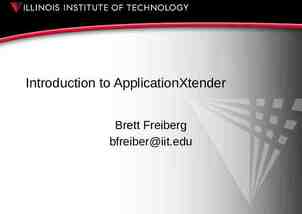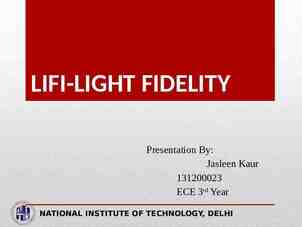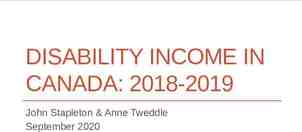Searching through e-Discovery Greg Buckles Julie Wade April 9, 2009
31 Slides799.00 KB

Searching through e-Discovery Greg Buckles Julie Wade April 9, 2009

GoToWebinarTips Click to hide or display the control panel on your screen Type your question into the Question and Answer Panel. The moderator will notify the presenter of submitted questions Searching through e-Discovery Greg Buckles Julie Wade, ACED 04.09.09

Thank you! Benchmark Legal Solutions 5101 Navigation, Houston, TX 77011 Telephone: 713.528.0002 [email protected]

Greg Buckles Owner of Reason-eD LLC 19 years of experience in forensics, discovery, record systems and software design to support Fortune 1000 companies. Started career as forensic criminalist working for the Houston Police Department’s Crime Lab. Mr. Buckles has worked for industry leaders such as Arnold, White & Durkhee, El Paso Corporation, Symantec Corporation and Attenex Corporation. Searching through e-Discovery Greg Buckles Julie Wade, ACED 04.09.09

Julie Wade Contract Paralegal with Donovan and Watkins, Marketing Consultant for In2itive Technologies. Over 25 years experience in the legal profession, having worked on complex litigation cases in state, federal and multi-jurisdictional courts of law. Received Advanced Certification in Electronic Discovery from Kroll OnTrack, Paralegal Certificate from University of North Texas. Member of the State Bar of Texas Paralegal Division (Chair District CLE, 2008-09); Women in eDiscovery (Secretary, Houston Chapter, 2008-09); ALSP; AIIM. Searching through e-Discovery Greg Buckles Julie Wade, ACED 04.09.09

Agenda Information Management Challenges Court’s View of Search Search Basics Types of Search Search Applications Tips & Tricks Resources Searching through e-Discovery Greg Buckles Julie Wade, ACED 04.09.09

Structured and Unstructured Data Structured data is data that sits in a database and can be mined and searched for information. Unstructured data consists of emails, word documents, instant messages, blogs, PDFs, videos, and audio recordings – all data that falls outside the traditional database. Merrill Lynch in 1998 estimated that 80% of all potentially usable business information originated in unstructured form. Searching through e-Discovery Greg Buckles Julie Wade, ACED 04.09.09

Information Management Challenges Unstructured data resides in different applications, databases, email exchanges and archives. Unstructured file-type data fastest growing area of all data types. “not go into business to begin with” – structured or unstructured, how do you search that anyway? Searching through e-Discovery Greg Buckles Julie Wade, ACED 04.09.09

Dealing with unstructured data Enterprise Content Management systems provide solutions to managing unstructured data content. Data mining software and other text analytics are used to find patterns in, or otherwise interpret, unstructured information. Common techniques for structuring text also involve manual tagging with metadata or crawling and indexing the data. Searching through e-Discovery Greg Buckles Julie Wade, ACED 04.09.09

Getting a Handle on File Management Litigation support and e-discovery are two examples of current applications requiring existing data to be indexed and searched – which is relatively easy to do with structured and semi-structured data, but has proven daunting with unstructured filebased data. Paralegals must acquire their client’s data maps and interview custodians. Searching through e-Discovery Greg Buckles Julie Wade, ACED 04.09.09

Court’s View of Search Peskoff v. Faber, 2006 WL 1933483 (D.D.C. July 11, 2006) United States v. O’Keefe, No. 06-249 (D.D.C. Feb. 18, 2008). Victor Stanley v. Creative Pipe, Civil Action No. MJG06-2662 (D. Md. May 29, 2008). Diabetes Centers of America, Inc. v. Healthpia America, Inc., 2008 WL 336382 (S.D. Tex. Feb. 5, 2008). Searching through e-Discovery Greg Buckles Julie Wade, ACED 04.09.09

Peskoff v. Faber Defendant asserted computer disks contained “all electronic files and email there were,” but the production did not include 2 years worth of emails received or authored by the plaintiff from 2001 – 2003. Court ordered defendant to search again and provide a detailed affidavit within 10 days specifying the nature of the search used in locating the responsive emails. Searching through e-Discovery Greg Buckles Julie Wade, ACED 04.09.09

United States v. O’Keefe First opinion to suggest judicial review of alleged search deficiencies requires expert testimony. “Given this complexity, for lawyers and judges to dare opine that a certain search term or terms would be more likely to produce information than the terms that were used is truly to go where angels fear to tread.” Searching through e-Discovery Greg Buckles Julie Wade, ACED 04.09.09

Victor Stanley v. Creative Pipe [A]ll keyword searches are not created equal . The only prudent way to test the reliability of the keyword search is to perform some appropriate sampling Searching through e-Discovery Greg Buckles Julie Wade, ACED 04.09.09

Diabetes Centers of America, Inc. v. Healthpia America, Inc. [S]anctions may be appropriate in other cases where evidence is lost because important searches were recklessly entrusted to untrained, unsupervised personnel. Searching through e-Discovery Greg Buckles Julie Wade, ACED 04.09.09

EDRM Reference Model Searching through e-Discovery Greg Buckles Julie Wade, ACED 04.09.09

Search Basics – EDRM Phases Searching through e-Discovery Greg Buckles Julie Wade, ACED 04.09.09

Define the Goal/Results Inclusion vs. Exclusion, Find vs. Filter Pinpoint identification of a particular document Identify privileged documents Identify responsive materials to discovery requests Cost constraints & budgetary considerations Identify who is best positioned to conduct and implement the search (vendor, paralegal) Searching through e-Discovery Greg Buckles Julie Wade, ACED 04.09.09

Realistic Search Goals ESI Collection NO SEARCH IS PERFECT False Negatives Search Results False Positives True Positives Searching through e-Discovery Greg Buckles Julie Wade, ACED 04.09.09

Structure the Search Plan and structure the search Identify the scope of data to be searched Identify who will be performing the search Identify the technology to be deployed Identify the processes to be implemented Searching through e-Discovery Greg Buckles Julie Wade, ACED 04.09.09

Execute the Search All your definitional planning work is now put to the test Monitor the search as it is being conducted and document the results captured from your search Document the results of your data hits, data samples, and your other search protocols Searching through e-Discovery Greg Buckles Julie Wade, ACED 04.09.09

Validate the Search The validation steps you undertake will uphold the veracity of the search methods you deployed Did the search include all the records that were to be searched Did you achieve the goals established during the definitional phase? Searching through e-Discovery Greg Buckles Julie Wade, ACED 04.09.09

Report Attorneys and client depend on the report to assess success and completeness. Known exceptions and errors must be declared. Reports are iterative, e.g., the results may require the search to be re-run. Final process of search is the “Report.” Searching through e-Discovery Greg Buckles Julie Wade, ACED 04.09.09

How Search Works Build an Index – 10-30% additional storage – Static Copy – Run once – search many Crawl/Streaming Text – No storage – Dynamic selection Searching through e-Discovery Greg Buckles Julie Wade, ACED 04.09.09

Types of Search Methodologies Full Text – Boolean – Keywords – Natural Language – hidden risks – Expanded Words Synonyms, grouping, related words, thesaurus Concept Clustering – folders v. visual analysis Searching through e-Discovery Greg Buckles Julie Wade, ACED 04.09.09

Keyword Search Normal Parameters The syntax in the search string Use of the keywords with or without stemming Use of keywords with certain wildcard specifications and their syntax Case-sensitivity of keywords used Consideration of target data sources Searching through e-Discovery Greg Buckles Julie Wade, ACED 04.09.09

Assumed Parameters Character coding of the text – UTF-8, UTF-16, CP1252, Unicode/WideChar etc. Language of the keyword, to select appropriate stemming Special character sets Tokenization schemes Searching through e-Discovery Greg Buckles Julie Wade, ACED 04.09.09
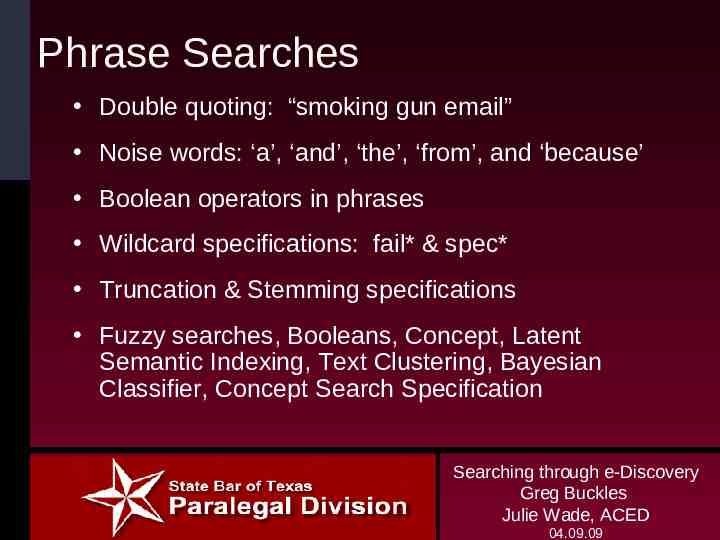
Phrase Searches Double quoting: “smoking gun email” Noise words: ‘a’, ‘and’, ‘the’, ‘from’, and ‘because’ Boolean operators in phrases Wildcard specifications: fail* & spec* Truncation & Stemming specifications Fuzzy searches, Booleans, Concept, Latent Semantic Indexing, Text Clustering, Bayesian Classifier, Concept Search Specification Searching through e-Discovery Greg Buckles Julie Wade, ACED 04.09.09

Search Applications Desktop Search – X1, Google, Isys, dtSearch, WDS, OmniFind Enterprise Search – IDOL, StoredIQ, Recommind, Kazeon, Symantec Processing Platforms – Cracker, Discover-e, Extractiva Review Platforms – Summation, Concordance, Attenex Forensic Search Searching through e-Discovery Greg Buckles Julie Wade, ACED 04.09.09

Tips and Tricks Foreign Languages Exception Handling Email Address Issues Partial Non-Indexed File Types/Locations Term Frequency Lists Analytics and Sampling Searching through e-Discovery Greg Buckles Julie Wade, ACED 04.09.09
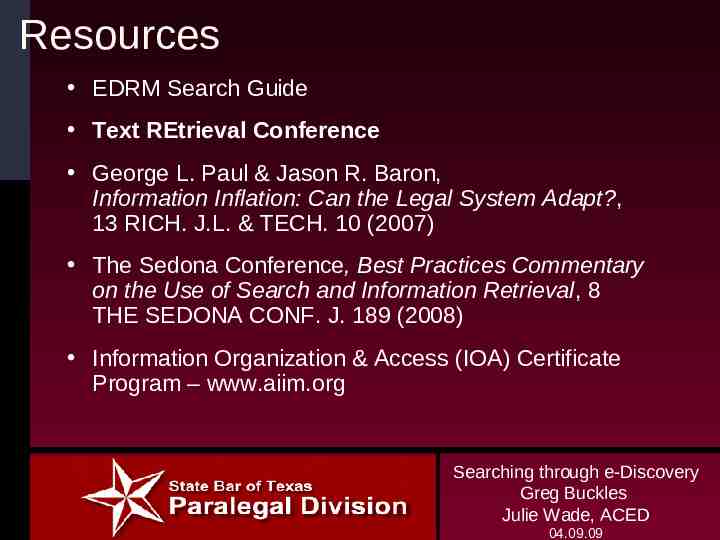
Resources EDRM Search Guide Text REtrieval Conference George L. Paul & Jason R. Baron, Information Inflation: Can the Legal System Adapt?, 13 RICH. J.L. & TECH. 10 (2007) The Sedona Conference, Best Practices Commentary on the Use of Search and Information Retrieval, 8 THE SEDONA CONF. J. 189 (2008) Information Organization & Access (IOA) Certificate Program – www.aiim.org Searching through e-Discovery Greg Buckles Julie Wade, ACED 04.09.09


